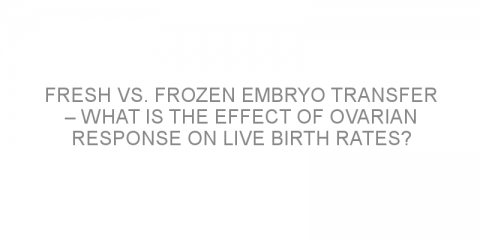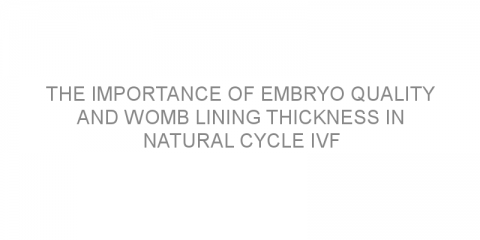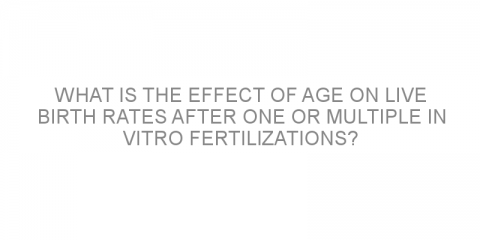In a nutshell The study compared the effectiveness of transferring frozen embryos (FzE) versus fresh embryos (FrE) for couples with infertility using in vitro fertilization (IVF). The main finding of the study was that using FzE over FrE in IVF did not improve the chance of having a healthy baby. Some background IVF is one of the procedures that...
Read MoreReason(s) for signing up-Considering reproductive technique(s)-In Vitro Fertilization (IVF) Posts on Medivizor
Are live birth rates higher in women with greater endometrial thickness undergoing fresh embryo transfer?
In a nutshell This study investigated if there is a link between endometrial thickness (EMT) and live birth rate (LBR) in women undergoing in vitro fertilization (IVF) with fresh embryo transfer (FET). They found that thicker EMT is associated with higher LBR in these women. Some background Infertility is an increasing problem worldwide....
Read MoreFresh vs. frozen embryo transfer – what is the effect of ovarian response on live birth rates?
In a nutshell This study investigated if ovarian response (OR) has an effect on pregnancy outcomes after embryo transfer (ET). They found that frozen ET (fzET) was associated with better pregnancy outcomes in women with high OR. Some background Assisted reproduction (AR) is used to treat infertility. It involves a number of steps. Controlled...
Read MoreDo antioxidants in the culture media improve IVF outcomes?
In a nutshell This study looked at whether adding antioxidants to the media used to culture oocytes (eggs) improved outcomes from in vitro fertilization (IVF). It found that antioxidant media led to more good quality embryos and higher pregnancy rates than standard media. Some background IVF is an infertility procedure in which oocytes (eggs) are...
Read MoreThe importance of embryo quality and womb lining thickness in natural cycle IVF
In a nutshell This study looked at whether womb lining thickness and embryo quality affect the natural cycle during in vitro fertilization (NC-IVF). It found that thicker womb linings and better quality embryos were related to higher pregnancy rates. Some background IVF is an infertility treatment in which eggs (oocytes) are removed from a...
Read MoreWhat is the effect of age on live birth rates after one or multiple in vitro fertilizations?
In a nutshell This study investigated the effect of age on the live birth rate (LBR) after one or multiple in vitro fertilization (IVF) procedures. They found that LBR increases after more IVF cycles in patients younger than 40 years. Some background In vitro fertilization (IVF) is the most common method of assisted reproduction (AR)....
Read MoreCan G-CSF growth factor improve implantation during IVF?
In a nutshell This analysis looked at whether granulocyte colony-stimulating growth factor (G-CSF) can improve in vitro fertilization (IVF) outcomes. This study found that G-CSF may improve pregnancy rates for women with two or more unsuccessful IVF cycles. Some background In vitro fertilization (IVF) is an infertility treatment where eggs...
Read MoreHow does genetic testing affect IVF outcomes for older mothers?
In a nutshell This study looked at genetic testing prior to implantation in women over 37 undergoing in vitro fertilization (IVF). It found that in couples that chose genetic testing, the miscarriage rate was much lower, and the overall likelihood of a live birth was similar. Some background When sperm and eggs develop, the number of DNA chromosomes...
Read MoreDoes anti-Mullerian hormone levels impact live birth rate after modified natural IVF?
In a nutshell This study investigated if anti-Mullerian hormone (AMH) can predict pregnancy outcomes after modified natural in vitro fertilization (mnIVF). They found that there was no link between AMH levels and live birth rate (LBR) after mnIVF. Some background In vitro fertilization (IVF) involves fertilizing an egg and sperm in a laboratory...
Read MoreDoes stress have an impact on IVF outcomes?
In a nutshell This study investigated if stress affects fertility outcomes (FOs) in patients undergoing in vitro fertilization (IVF). They found that stress does not have a negative effect on FOs. Some background Infertility affects many couples. Many infertile couples chose to undergo in vitro fertilization (IVF). Both...
Read MorePolycystic ovary syndrome: can myo-inositol affect fertility outcomes?
In a nutshell This study investigated the effects of myo-inositol (MYO) on fertility outcomes in women with polycystic ovary syndrome (PCOS). They found that MYO was associated with improved embryo quality and fertilization rates. Some background Polycystic ovary syndrome (PCOS) is a common cause of infertility in women. In vitro...
Read MoreOvarian stimulation – minimal versus conventional in women seeking treatment for infertility
In a nutshell This study compared minimal ovarian stimulation (MOS) to conventional ovarian stimulation (COS) in women undergoing fertility treatment. They found that MOS resulted in greater numbers of good-quality embryos and oocytes (eggs) in these women. Some background During fertility treatment, women undergo controlled ovarian...
Read More














